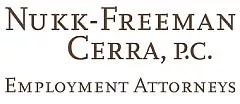- with Senior Company Executives, HR and Finance and Tax Executives
UPDATE: On March 14, 2025, the U.S. Court of Appeals for the Fourth Circuit granted the government's motion to stay the preliminary injunction issued by U.S. District Judge Adam B. Abelson which blocked enforcement of key provisions in President Trump's anti-DEI executive orders. Accordingly, the government may once again enforce EO 14151, Ending Radical and Wasteful Government DEI Programs and Preferences, and EO 14173, Ending Illegal Discrimination and Restoring Merit-Based Opportunity. For additional information on the Fourth Circuit's ruling, see HERE.
In the ongoing battle to defend the legality of diversity, equity, inclusion, and accessibility (DEIA) initiatives, DEIA proponents have won another round. To learn more about the current state of President Trump's anti-DEIA executive orders and what you could (and should) do now, review this brief recap of legal developments and valuable takeaways from 16 Attorneys General on lawful DEIA initiatives.
Federal Judge Blocks Enforcement of Key Provisions in Anti-DEI(A) Executive Orders
As we previously reported HERE, on February 21, 2025, Judge Adam B. Abelson of the U.S. District Court for the District of Maryland issued a preliminary injunction in National Association of Diversity Officers in Higher Education, et al. v. Trump, blocking enforcement of three key provisions in two Executive Orders issued to eliminate certain DEI and DEIA programs and initiatives (see HERE).
In swift response, the Trump Administration filed a motion to stay the preliminary injunction pending an appeal, citing a likelihood of success on the merits; that plaintiffs' allegations of irreparable harm are purely speculative; that the injunction "improperly intrudes on intra-executive policy implementation by enjoining the President's policy directives to federal agencies"; and that the injunction improperly impedes federal agencies from enforcing anti-discrimination laws.
On March 3, Judge Abelson denied the motion, finding that the plaintiffs demonstrated a likelihood of success on the merits based on the unconstitutional vagueness of the challenged provisions. While Judge Abelson acknowledged that the executive branch is entitled to have and pursue policy goals, he emphasized that such goals must comply with the Constitution, including the First Amendment's Free Speech Clause and the Fifth Amendment's Due Process Clause. Accordingly, the preliminary injunction remains effective pending the appeal.
Joint Letter Issued by Attorneys General on Lawful DEI(A) Initiatives
In the meantime, employers may benefit from guidance issued by Attorneys General from 16 states – including New York, New Jersey, and California – in response to Executive Order 14173 which, in part, seeks to eliminate "illegal" DEI and DEIA programs and initiatives in the private sector (see HERE). The joint letter clarifies the limits of the Executive Order, and provides guidance on lawful DEIA initiatives and best practices to support inclusion in a legally compliant manner.
The overarching sentiment is very clear: DEIA best practices are not illegal, and the Executive Order cannot and does not prohibit these otherwise lawful practices and policies. The Attorneys General emphasize that policies and practices promoting DEIA "are not the same as preferences in individual hiring and promotion decisions that have been found to be unlawful." The letter clarifies that DEIA initiatives are not the same as affirmative action and do not involve providing preferences to individuals based on protected characteristics – instead, DEIA best practices ensure that no individual is overlooked because of a protected characteristic and that individuals receive the necessary support to develop their skills and contribute to the success of their organizations. Accordingly, the letter advises employers to continue implementing lawful DEIA initiatives to support inclusion and comply with legal obligations.
Employer Takeaways
Understandably, employers may be hesitant to implement or reinstate their DEIA policies. To address these concerns, the Attorneys General included a list of best practices to ensure legal compliance, including the following:
- Identify and remediate policies and practices that have an unlawful disparate impact on current and prospective employees;
- Prioritize widescale recruitment to attract applicants from various backgrounds;
- Use panel interviews to ensure fair and objective decisions;
- Set standardized criteria to evaluate individuals based on skills and experience;
- Ensure equal access to all aspects of employment and professional development;
- Create clear protocols to report discrimination or harassment;
- Provide channels for employees to communicate about workplace experiences;
- Establish work groups to create strategies that support inclusive practices; and
- Integrate practices that promote belonging and unity into an organization's everyday way of doing business.
As always, employers should ensure their DEIA policies comply with federal, state, and local laws.
The content of this article is intended to provide a general guide to the subject matter. Specialist advice should be sought about your specific circumstances.


